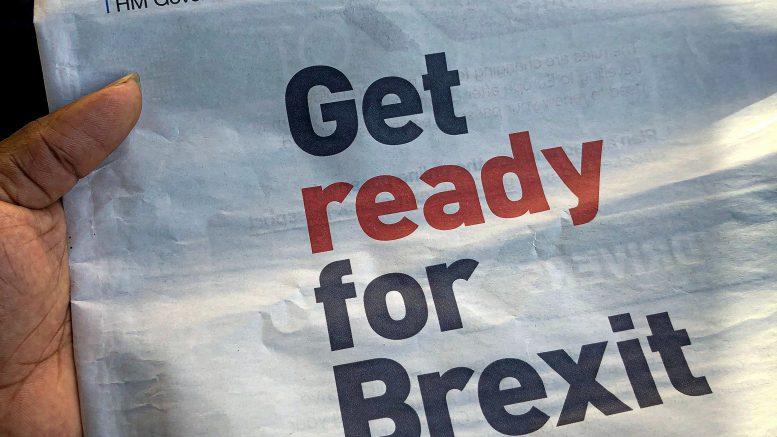“The EU will not sacrifice its future for the present”. With the failure of the negotiations, the UK will leave the EU without a trade deal, but what effect will this have on European markets?
The EU chief negotiator Michel Barnier wrote on Twitter: “Access to our market is subject to conditions”
Barnier announced that he had “briefed all member states at the General Affairs Council today” on the progress of negotiations with London on the future partnership with the EU, emphasising on the “full unity” of the 27.
🇪🇺🇬🇧 Briefed all Member States at the #GAC today. Full unity. We will never sacrifice our future for the present. Access to our market comes with conditions.
Working closely with @DavidGHFrost and team to prepare upcoming meeting between @vonderleyen and @BorisJohnson. pic.twitter.com/3HTtnYZ9e0
— Michel Barnier (@MichelBarnier) December 8, 2020
London and Brussels are still carrying out negotiations to reach a trade agreement, but what we see today is the failure of every attempt to reach a meeting point.
The Brexit issue keeps in suspense not only the UK, but also all the members of the EU who, based on the outcome of the negotiations, will find themselves facing completely different scenarios.
The transition period is about to expire, as the crucial date, the 31 December, is now very close, and with 2021 the divorce between the United Kingdom and the European Union will be a fact.
The fear is that without a compromise between London and Brussels to regulate commercial relations in the future, the situation could become rather chaotic. But how well-founded are these fears? First of all, we have to understand if the result of the negotiations is really going to be a flop, in case the two parties will not be able to find an agreement.
Boris Johnson is now in Brussels, for what will likely be the last possible attempt at finding a meeting point with the EU.
The whole EU and the financial markets are following this meeting with great interest, hoping for the two sides to finally reach an agreement before the end of the transition period.
The last hours of negotiations to reach a trade agreement on Brexit
The latest talks between the British Prime Minister, Boris Johnson, and the President of the European Commission Ursula Von Der Leyen are underway, but the forecasts are not so rosy; so much so that both parties believe that even the last hours of negotiations between the two sides will not lead to any result.
On Monday evening Johnson and Von Der Leyen talked about the possibility of reaching a deal, and agreed that such a scenario is still a long way off, despite repeated attempts by both sides to reach a meeting point.
There are still “significant differences” in particular on three key issues, namely: fishing rights, rules for fair competition and governance agreement.
From London, we can see the scenario of a “No-Deal Brexit”, which has been much discussed since the beginning, as increasingly likely. Some observers believe that Johnson has given himself the last 48 hours to reach an agreement, after which all that remains is to leave the EU without an agreement.
In the meantime, pessimism seems to have also conquered the EU countries, starting with Ireland, which certainly lives the issue of Brexit more closely. Dublin Foreign Minister Simon Coveney said some countries are resigning themselves to the idea that it will ultimately be a no-deal Brexit, meaning the UK will exit from the EU single market and customs union without any commercial agreement.
The entire bloc of EU countries would therefore be moving in another direction, that of preparing a sort of emergency plan. A situation that would be a euphemism to describe as complex, also due to the recent declarations coming from Paris. France has in fact already made it known that it is ready to veto any agreement that does not adequately protect the fishing rights of its country in British waters.
Any agreement should, in any case, be ratified between the EU and the UK by the end of the transition period, which will expire on 31 December. Otherwise, Great Britain will be out of the EU without a trade agreement, that is, without shared rules on crucial issues, especially economic and commercial ones. In this scenario, the EU would be particularly disadvantaged.
What will be the effects of Brexit on European markets?
It is clear that the uncertainty surrounding the Brexit issue, with an increasingly low probability that a trade agreement will be reached, is not good for the financial markets of the main European stock exchanges.
The shares of the indices of the EU countries can only open to the downside as the talks between London and Brussels proceed without results and the end of the transition period is now around the corner.
Today London’s FTSE is down 19 points to 6,539, Germany’s DAX 5 points to 13,262, France’s CAC 40 5 points to 5,563 and Italy’s FTSE MIB 21 points to 22,064, according to IG.
Words: Deborah Melchiorre | Subbing: Sara Guadrini
Update: https://thevoiceoflondon.co.uk/eu-deputy-commission-on-brexit-agreement-reached-with-london/

